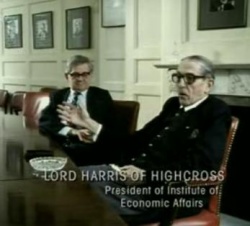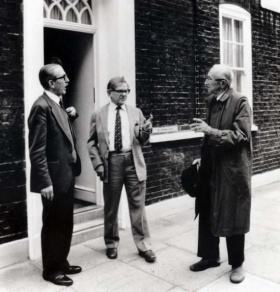Institute of Economic Affairs

The Institute of Economic Affairs (IEA) is a seminal free market think-tank based in London. Through its promotion of free market theorists like Milton Friedman it provided an intellectual rationale for business friendly political and economic reforms introduced by the Thatcher government in the UK - a political programme which later came to be known as neoliberalism.
Contents
Origins and history

Ed Vaizey writes in The Sunday Times:
- The oldest and biggest daddy of them all, the Institute of Economic Affairs, exists to propagate the ideas of free markets and privatisation. It has been going for nearly 50 years, and advises governments all over the world on ways to denationalise and bring in market systems.[1]
The Institute of Economic Affairs was set up in the mid-1950s by Antony Fisher, an Old Etonian chicken farmer who had made his fortune by pioneering US battery farming techniques in the UK. Fisher had joined the Mont Pelerin Society and had been advised by Friedrich von Hayek against going into politics to spread the neoliberal philosophy. Instead Hayek recommended that Fisher change society by targeting intellectual opinion. [2] Fisher therefore founded IEA and recruited the Cambridge-trained economist Ralph Harris as director, and Arthur Seldon as research director. [3] The BBC documentary Tory! Tory! Tory! states: 'They would grow old together side by side, Seldon writing, Harris hustling.' [4]
IEA was incorporated on 29 March 1963 and registered as a charity on 25 August 1969. [5]
Conservative Movement
In a March 2009 presentation Tim Montgomerie and Matthew Elliott described IEA as part of the infrastructure of the conservative movement in Britain.[6]
Views/Activities
Agriculture and the environment
IEA was founded in the 1950s by Antony Fisher out of a fortune made from intensively farmed broiler chickens (Buxted Chickens). Given a founding father who was both a pioneer of factory farming and an extreme free marketeer, it is hardly surprising that the IEA has consistently promoted the view that deregulated intensive farming and unfettered 'free trade' are of great benefit to the environment. But it wasn't until the 1990s that the IEA started seriously to focus on environmental issues.
In 1990 the IEA warned that 'green' policies would lead to an 'ecological hell' and a plummeting standard of living. In 1993 the IEA launched its Environment Unit. Its director was Roger Bate. A formal launch came in March 1994 to coincide with the publication of the Unit's first book, Global Warming: Apocalypse or Hot Air? The book was co-edited by Roger Bate and Julian Morris. Morris had been a Research Fellow at the IEA since 1993 and in July 1998 became the Environment Unit's co-director.
In August 1999, Bate and Morris published a book called Fearing Food: Risk, Health and the Environment. According to an IEA press release:
- The book shows that intensive agriculture is good for health and the environment, and is essential if the world's population is to be fed without converting vast areas of biodiverse ecosystems into cropland, which would be necessary if organic agriculture, with its lower yields, were used.[7]
It contained a chapter by Dennis Avery of the Hudson Institute, 'The Fallacy of the Organic Utopia', and one defending GM crops co-written by John Hillman from the Scottish Crop Research Institute and Michael Wilson of Horticulture Research International.
Bate and Morris are affiliated to a series of organizations, other than the Institute of Economic Affairs, several of which they founded themselves. Fearing Food was said to be a publication of the European Science and Environment Forum (ESEF), which Bate both co-founded (1994) and directed (the original ESEF website was registered by Morris). However, a press release announcing the book, headed 'Londoners demand regulation of potentially deadly organic food', was sent out in the name of the IEA.[8]
A year later, Morris appeared in his role as director of the IEA's Environment Unit in a ‘Counterblast’ programme on BBC 2 TV (broadcast 31 January, 2000). The programme was written and presented by Bate in his role as Director of ESEF. No mention was made of Bate's IEA affiliation and the same went for several other IEA intimates, such as IEA Media Fellow Richard D. North. The Counterblast series is intended by the BBC to allow 'members of the public' to air their views.
In June 2000 the IEA hosted An Occasional Lecture at their offices in London, entitled 'Frankenfood and Monarch Butterflies'. It was given by CS Prakash of the AgBioWorld Foundation. AgBioWorld's campaign was co-founded by Greg Conko of the Competitive Enterprise Institute, where Bate is an adjunct fellow.
In September 2000 the assistance of the Institute of Economic Affairs was acknowledged by the authors of an anti-organic report launched in the U.S. The authors included Monsanto's former director of executive communications, Graydon Forrer, and Alex Avery of the Hudson Institute. The controversial ideas on organic food of Alex's father, Dennis Avery, had been central to Fearing Food and the way in which Bate and Morris had launched it a year earlier (with a press release about "deadly organic food", see above).
Among others associated with the IEA's Environment Unit are Matt Ridley and Philip Stott. Stott claims to have 'no formal connections with the IEA' and not to 'share their economic views'. Note the stress on 'formal'. He entirely shares their antipathy towards environmental concerns, is close to Morris and Bate, has had a monograph published by the IEA, and has contributed to IEA-led events.
The IEA claims to have 'no corporate view' but this appears to be a device to enable the IEA to distance itself where convenient from the often controversial views promoted by its staff and associates.
Privatisation
The IEA are known for their work in the field of privatisation. It was they who commissioned Stephen Littlechild in 1981 to write the paper "Ten steps to denationalisation". Littlechild later became one of the four "regulators" who oversee 20% of the UK's GDP in the form of the four utilities: Gas, Water, Electricity and Telecommunications. They have also influenced the Government's minimum wage policy, promoted the notion that "non-traditional" families (i.e. black and Asian) produce more delinquent children, and lately have advocated that "student loans should be charged at a higher rate of interest." Mrs Thatcher herself stated that "What we have achieved could never have been done without the leadership of the IEA."
Water
The IEA has been a consistent advocate of increasing the 'purity' of the privatisation arrangements in the water industry in England and Wales. Regards Scotland, two of the IEA's most influential members John Blundell and Colin Robinson have written regularly on the case for privatisation of Scotland's water services. Colin Robinson wrote a particularly forceful advocacy of privatisation through the Policy Institute [9]. The IEA, in conjunction with Marketforce organise conferences considering issues pertaining to water and the commercial opportunities within the sector. These conferences are economically prohibitive to people outside the industry.
Tobacco
IEA has also campaigned against the ban on smoking in pubs and tobacco displays in shops. It published a report in 2010 claiming that the ban on tobacco displays risks 'significant economic damage and a deterioration in public health'. The claims have been questionined by researchers.[10]
Organisation and status
Charitable status
The IEA states it is 'entirely funded by voluntary donations from individuals, companies and foundations ...it does no contract work, accepts no money from government and is independent of any political party. [11] However questions have been raised over its right to charitable status, with Labour MP Dale Campbell-Savours in a 1991 House of Commons debate[12] describing IEA's activities as "patently political".
Think tank networks and connections
Democracy Institute Connections
According to an article in the Guardian:
- The Democracy Institute's Patrick Basham and John Luik launch their report, The war on working-class culture: How political elites denormalise a way of life, on Thursday evening (6th May 2010) in Westminster at the Institute of Economic Affairs[13]
Stockholm Network
The Institute of Economic Affairs is a former member of the Stockholm Network, they left the network in 2005 because 'as an educational charity we felt it was inappropriate to be a member of an organisation whose mission we could not control'.[14]
Affiliations
- Democracy Institute | Stockholm Network - According to a Telegraph blog by Alex Singleton, the IEA was formerly (prior to January 2009) a member of the Stockholm Network, but left in 2005.[15] | University of St Andrews Liberty Club[16][17] |
Offshoots
IEA Health and Welfare Unit | Social Affairs Unit | Institute for Civil Society | Civitas | Centre for Social Cohesion
References, Resources and Contact
Resources
BBC:Institute of Economic Affairs - page on the IEA's attacks on the BBC
PBS, Command Heights, Interview with Lord Ralph Harris, 17 July 2000
References
- ↑ Ed Vaizey, "IEA is still the oldest and biggest daddy of them all!", Sunday Times, 15 July 2002, accessed in Web Archive, 16 March 2009
- ↑ Tory! Tory! Tory!, broadcast Friday, 10 August from 2340 BST on BBC Four. See also Brian Wheeler, 'Tory! Tory! Tory! (Part one)', BBC News Online, 8 March 2006.
- ↑ Brian Wheeler, 'Tory! Tory! Tory! (Part one)', BBC News Online, 8 March 2006.
- ↑ Tory! Tory! Tory! broadcast Friday, 10 August from 2340 BST on BBC Four.
- ↑ The Charity Commission, 235351 - THE INSTITUTE OF ECONOMIC AFFAIRS LIMITED [Accessed 9 October 2009]
- ↑ Tim Montgomerie, The growth of Britain's conservative movement, ConservativeHome, 14 March 2009.
- ↑ IEA press release, cited by Andrew Rowell in "Organicised crime: The backlash against organic food has begun. But who is behind it?", The Ecologist, Vol. 31, No. 1, February 2001, accessed March 16 2009.
- ↑ "Londoners demand regulation of potentially deadly organic food", press release, Institute of Economic Affairs, 16 August 1999.
- ↑ Policy Institute, the Scottish Water Industry', accessed 12 June 2008
- ↑ Randeep Ramesh, Anti-smoking law may be overturned in government review, The Guardian, 14 July 2010
- ↑ IEA website accessed 9 June 2010
- ↑ Hansard HC, 20 June 1991 accessed 9 June 2010
- ↑ Patrick Basham & John Luik, Working class are under attack from health paternalism, The Guardian, 29-April-2010, Accessed 13-May-2010
- ↑ Clare Rusbridge, FW:Stockholm Network, Institute of Economic Affairs, E-mail to Steven Harkins 12-May-2010, 6:05pm
- ↑ Alex Singleton, Free-market network demands bail-out for pharmaceutical industry, Telegraph, January 19th, 2009, accessed 20 May 2010
- ↑ Who We Are, Liberty Club (Accessed: 21 September 2007)
- ↑ Clare Rusbridge, FW: Stockholm Network, E-mail to Steven Harkins, 12-May-2010 6:05pm